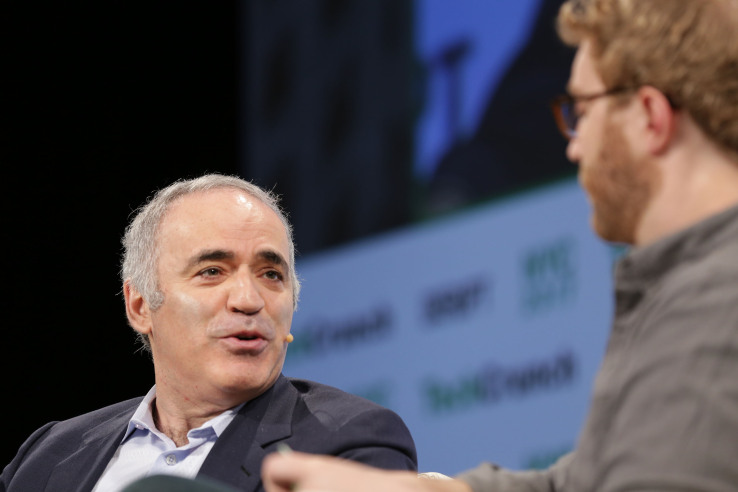

How can humans stay ahead of an ever growing machine intelligence? “I think the challenge for us is to always be creative,” says former world chess champion Garry Kasparov, speaking on stage here at TechCrunch Disrupt New York.
It’s twenty years since Kasparov lost to Deep Blue, IBM’s supercomputer. The 1997 AI stress test equivalent of DeepMind’s AlphaGo beating Lee Sedol last year.
“I would remind people that I won the first match,” quipped Kasparov when the historic defeat was brought up.
“There are certain things that we can do that machines are not at all going to be able to replicate,” he said. “It’s things like love, emotions, passions… One of the rules is anything that we know how we do machines can do it. But there’s so many things that we do that we don’t know how we do — and that’s where we humans can excel.”
“Machines don’t have understanding, machines don’t recognize strategic patterns, and machines don’t have a purpose,” he added, arguing for a blend of what humans and machines do best — and finding “a way to bring together these complementary skills”.
The new generation of self-learning AIs — being built by the likes of DeepMind — also presents another challenge for humans, in that it is much harder to understand the decisions of these algorithms, said Kasparov, flagging this as “one of the biggest challenges” for applying this type of tech.
“You cannot identify why iteration five is better than iteration 10,” he said. “With Deep Blue if you have a couple of years to spare… you can find out why a certain move was there. With AlphaGo the problem is you can only guess. And I think that’s one of the biggest challenges with the new generation of AI.”
While he was generally upbeat about the combined possibilities of humans and machines — touching on his Advanced Chess concept, for example, in which machines and humans play together as a team — he also warned over some of the societal threats here.
Machines have been constantly replacing all sorts of jobs… We should not talk about jobs being lost but people suffering.
Technology is “a double-edged weapon”, he said, pointing to regimes like Putin’s in Russia appropriating tech tools to try to “undermine the very foundations of the free world and to topple dissent in their own countries”.
“We should realize the dangers of Internet and free space being polluted by fake news and the misinformation run by the [rogue] states — mainly of course Putin’s regime that is so sophisticated,” he said, adding: “Putin doesn’t care who he supports outside Russia to spread chaos and to create more uncertainty and to undermine democracy as an institution and even as a concept.”
He also discussed the threat that increasingly capable AI poses to (human) jobs, arguing that we should not try to predict what will happen in the future but rather look at immediate problems.
“We make predictions and most are wrong because we’re trying to base it on our past experience,” he argued. “I think the problem is not that AI is exceeding our level. It’s another cycle. Machines have been constantly replacing all sorts of jobs… We should not talk about jobs being lost but people suffering.
“We have to look for new opportunities. In my opinion the biggest challenge is not that the jobs are being lost, but the challenge is that they are not being lost fast enough. Because unless you have a cycle moving fast you will not be able to create new sustainable jobs. You will have to create a new growth that will help to replace jobs that are being lost.”
“AI is just another challenge. The difference is that now intelligence machines are coming after people with a college degree or with social media and Twitter accounts,” he added.

